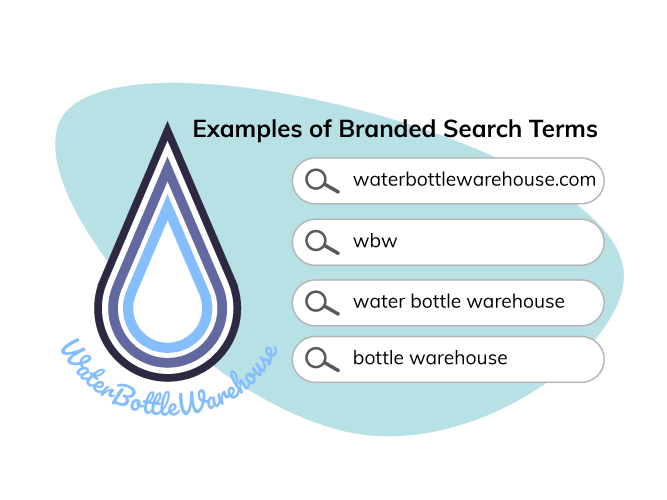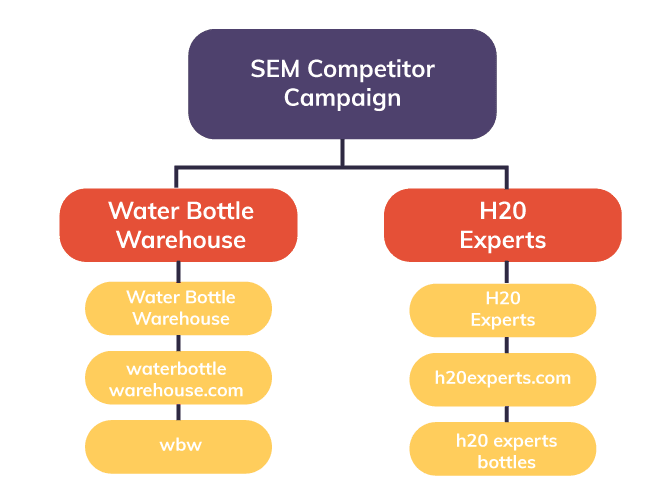Search for your business online right now. Is your business the top search result? Hopefully you are, but what if your competitor is showing in the top ranking ad position? Fear not, we are here to help make sure you rank first for your branded searches. Then we’ll show you how to bid on competitor keywords so you can show in their branded searches.

What are Branded Searches?
First, let’s clarify what branded searches are. Imagine your business is called Water Bottle Warehouse. Your branded searches could include terms like “waterbottlewarehouse.com”, “water bottle warehouse”, “wbw”, “bottle warehouse” and any other variation of your name that customers use to search for you. Ideally when a user searches for one of these variations, your ad or your site is the first to appear.

However, this isn’t always the case. It might turn out that when you search “water bottle warehouse”, an ad for your competitor The Thermos Factory shows up first. But how did they do it? How do you stop them? Are they even allowed to show up first for your brand name?

How Did My Competitors Outrank Me on Google?
They outbid you for your branded searches. You might not have updated bids for these terms in awhile or maybe their terms are already bid at an efficient level, and don’t warrant more spend. Either way, The Thermos Factory was able to surpass you in ad rank and display on your branded traffic.


Can I Stop Competitors From Bidding on My Brand?
There are two approaches. 1)You can raise bids and outbid them for your branded searches, but be careful that you don’t overspend on traffic. 2) You can choose not to worry about it for the time being. Simply seeing a competitor’s ad on your branded search doesn’t mean customers will automatically switch brands. Consider the brand loyalty of your customers and your average order value (AOV) when determining how high to set your bids for branded terms.

Are My Competitors Allowed to Show Up First On My Branded Terms?
Yes, bidding on your competitors’ branded terms is fair game, but with one caveat —they cannot add your brand name in the headline or text. For example, The Thermos Factory can’t make their headline “We Are Better Than Water Bottle Warehouse”, but they can make their headline “We Are Better Than Them”. They also can’t use any of your trademarked phrases anywhere in their ad copy. Want to learn how to rank first on your competitors branded searches? Check out our article here.


When to Worry About Search Results
If a user is searching for your brand, then they are likely already familiar with your product to some extent. However, if you’re getting regularly outbid by a random competitor for a user who previously converted through PLAs or Paid Social, that’s a potentially missed opportunity. You could lose a more valuable customer who already knows and possibly likes your product.
In order to stop this from happening, make sure you frequently check your branded searches and stay on top of your bids for your own branded terms. Omnitail analysts regularly monitor branded terms for our clients and have a lot of familiarity with best practices for branded campaigns. If you’d like us to analyze your account and make suggestions for improvement, you can contact an analyst here.

How to Slide into Your Competitors’ Branded Searches
Competitor traffic can be a valuable addition to your search campaigns. After all, people searching for your competitors’ products probably have a lot of overlap with your own customers. You need to bid higher than your competitors on their own branded terms. You will also need to keep up with top-of-page and first page bids. Thankfully, Google Ads has you covered. Google provides many metrics to help you stay up to date with what it takes to be on the top of the search results.
How to Set Up Competitor Search Campaigns

For all of my search accounts, I include a campaign called “SEM Competitors”. This is where I add competitor associated keywords into a branded campaign. For example, a brand called The Thermos Factory might have an ad group for a competitor, WaterBottle Warehouse, with all the branded search variations for WaterBottle Warehouse such as “waterbottlewarehouse.com” or “wbw”. I recommend following this account structure to organize your competitors and their branded search terms

Things to Consider Before Bidding on Competitors’ Branded Search Terms
1. Does Your Brand Drive Sales?
Bidding on competitors’ branded search terms can create a significant source of new customers and revenue for your company, but there are a few factors to consider. First, outbidding your competitors’ branded search terms is most likely to be successful for products where brand name isn’t the main driver for the sale. For example, if Nike released a limited edition new tennis shoe, no amount of Adidas ads is likely entice a Nike customer to purchase Adidas instead.
However, if there is a big brand that you compete against and you think your value proposition is more appealing, it might be worth it to bid against those bigger retailers. For instance, if you have a local brick-and-mortar store, users may be interested in buying something locally that isn’t otherwise available to them immediately. In the end though, it’s usually unwise to spend all your money trying to compete with a company that’s out of your league—consider the costs before you act.
2. Average Order Value
Another factor to consider is the average order value (AOV) for your products. If you’re selling thousand dollar products and your customers aren’t brand loyal, staying at the top of the search results could be a big deal for your company—thus you’d want to keep your bids high for your brand name.
On the other hand, if your AOV is only $25 and you have a highly loyal audience (if you’re a manufacturer, for example), it’s probably more worthwhile to direct spend towards product ads or another channel.
3. Understand Your Competitors
Understand who your most important competitors are. If you explore Google Auction Insights, you will see a wide variety of companies who show on similar search results, but that doesn’t mean you should bid against all of them. In order to bid on the correct competitors, you need to understand your target audience. For example, if you’re a discount shoe retailer you probably shouldn’t pay to outbid Nike because you’re not targeting the same market.

Final Suggestions
Bidding on competitor terms can be a good idea for some retailers, but it won’t work for everyone. Understand your customers’ brand loyalty, the value of your products and your average order value, and your competitors before deciding to allocate spend to this strategy. As always, make sure you’re following Google policies with regard to brand names and trademarks.
Still confused? Reach out and speak to an analyst today!








